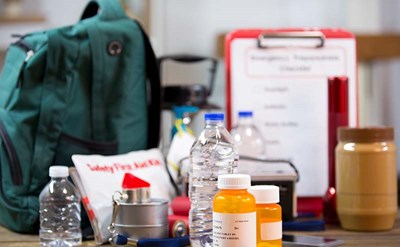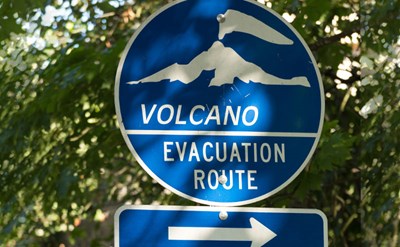Earthquakes can strike suddenly and without warning, with devastating loss of life and property.
To prepare:
- Develop an earthquake plan and review and rehearse it with your family. Practice dropping to the floor and taking cover under a sturdy table or desk, while holding on and protecting your eyes by burying your face in the crook of your arm.
- Review your disaster plan with family members, caregivers and babysitters.
- As part of your plan, reserve a safe place in every room of your house — under a sturdy table, desk or along an inside wall in an area that is free of glass or anything that can fall on you.
- Keep a working fire extinguisher handy and know how to use it.
- Know where the shut-off valves are located in your home for gas, water and electricity.
- Select an out-of-the-area family contact or friend to notify in the event of a quake.
- If you live in an earthquake-prone area, secure your home and address any hazards — store breakable objects, hang heavy or unstable objects away from where people might get injured and maintain your home so there are no cracks in your foundation or ceiling. In addition, securely store pesticides and chemicals and your water heater to the wall. Secure bookcases, china hutches and other heavy, potentially mobile furniture to wall studs with bolts or other devices. Put latches on cupboards.
- Check with a building inspector or other professional about additional home foundation and structure reinforcement measures.
In the event of an earthquake:
- Drop to the floor and find the nearest place of secure cover, and then hold on.
- If in bed, stay put and hold on while protecting your head with a pillow.
- If outdoors, drop to the ground and stay away from buildings, tall trees, power lines and anything else that might fall on top of you.
- If in a car, slow your speed and follow the directions given above. Do not exit the vehicle until after the tremors stop, unless circumstances created by the quake place you in immediate danger.
After an earthquake:
- Check yourself and others for injuries; administer first aid, if necessary; call 911 or your local emergency number only if injuries appear life threatening but be aware that ambulance service may be delayed.
- Get rid of fire hazards and extinguish small fires.
- Turn off the gas if you detect an odor or if there’s a chance it’s leaking, especially if any fires are nearby.
- Check your home for structural or other damage; be prepared to evacuate if it appears unsafe.
- Watch television or listen to the radio for instructions and updates.
- Be prepared for aftershocks. Drop, take cover and hold onto a secure object if tremors begin again.
- Be aware that telephone service may be cut off or that circuits may be overloaded; use the phone only if caught in a life-threatening situation.
 American College of Emergency Physicians
American College of Emergency Physicians







